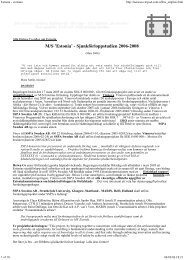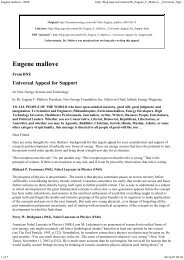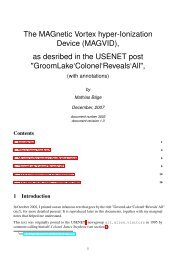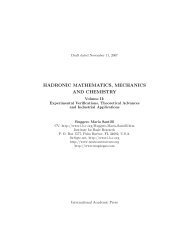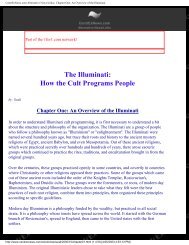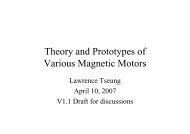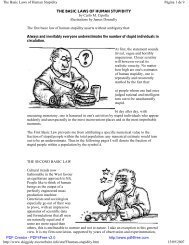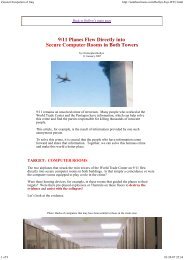You also want an ePaper? Increase the reach of your titles
YUMPU automatically turns print PDFs into web optimized ePapers that Google loves.
<strong>TBR</strong><strong>News</strong>.org http://blog.lege.net/content/TheVoiceOfTheWhiteHouse<strong>2008</strong>08<strong>18</strong>.html<br />
of Alzheimer’s Disease. Before the late Assistant Director Crowley was cold, Joseph Trento, a<br />
writer of light-weight books on the CIA, descended on Crowley’s widow at her town house on<br />
Cathedral Hill Drive in Washington and hauled away over fifty boxes of Crowley’s CIA files.<br />
Once Trento had his new find secure in his house in Front Royal , Virginia, he called a<br />
well-known Washington fix lawyer with the news of his success in securing what the CIA had<br />
always considered to be a potential major embarrassment. Three months before, July 20th of that<br />
year, retired Marine Corps colonel William R. Corson, and an associate of Crowley, died of<br />
emphysema and lung cancer at a hospital in Bethesda, Md.<br />
After Corson’s death, Trento and a well-known Washington fix-lawyer went to<br />
Corson’s bank, got into his safe deposit box and removed a manuscript entitled ’Zipper.’ This<br />
manuscript, which dealt with Crowley’s involvement in the assassination of President John F.<br />
Kennedy, vanished into a CIA burn-bag and the matter was considered to be closed forever.<br />
The small group of CIA officials gathered at Trento’s house to search through the<br />
Crowley papers, looking for documents that must not become public. A few were found but, to<br />
their consternation, a significant number of files Crowley was known to have had in his<br />
possession had simply vanished.<br />
When published material concerning the CIA’s actions against Kennedy became public<br />
in 2002, it was discovered to the CIA’s horror, that the missing documents had been sent by an<br />
increasingly erratic Crowley to another person and these missing papers included devastating<br />
material on the CIA’s activities in South East Asia to include drug running, money laundering and<br />
the maintenance of the notorious ’Regional Interrogation Centers’ in Viet Nam and, worse still,<br />
the Zipper files proving the CIA’s active organization of the assassination of President John<br />
Kennedy..<br />
A massive, preemptive disinformation campaign was readied, using<br />
government-friendly bloggers, CIA-paid "historians" and others, in the event that anything from<br />
this file ever surfaced. The best-laid plans often go astray and in this case, one of the compliant<br />
historians, a former government librarian who fancied himself a serious writer, began to tell his<br />
friends about the CIA plan to kill Kennedy and eventually, word of this began to leak out into the<br />
outside world.<br />
The originals had vanished and an extensive search was conducted by the FBI and CIA<br />
operatives but without success. Crowley’s survivors, his aged wife and son, were interviewed<br />
extensively by the FBI and instructed to minimize any discussion of highly damaging CIA files<br />
that Crowley had, illegally, removed from Langley when he retired. Crowley had been a close<br />
friend of James Jesus Angleton, the CIA’s notorious head of Counterintelligence. When<br />
Angleton was sacked by DCI William Colby in December of 1974, Crowley and Angleton<br />
conspired to secretly remove Angleton’s most sensitive secret files our of the agency. Crowley<br />
did the same thing right before his own retirement , secretly removing thousands of pages of<br />
classified information that covered his entire agency career.<br />
Known as “The Crow” within the agency, Robert T. Crowley joined the CIA at its<br />
inception and spent his entire career in the Directorate of Plans, also know as the “Department of<br />
Dirty Tricks,”: Crowley was one of the tallest man ever to work at the CIA. Born in 1924 and<br />
raised in Chicago, Crowley grew to six and a half feet when he entered the U.S. Military Academy<br />
at West Point in N.Y. as a cadet in 1943 in the class of 1946. He never graduated, having enlisted<br />
in the Army, serving in the Pacific during World War II. He retired from the Army Reserve in<br />
1986 as a lieutenant colonel. According to a book he authored with his friend and colleague,<br />
William Corson, Crowley’s career included service in military intelligence and Naval<br />
Intelligence, before joining the CIA at inception in 1947. His entire career at the agency was spent<br />
within the Directorate of Plans in covert operations. Before his retirement, Bob Crowley became<br />
assistant deputy director for operations, the second-in-command in the Clandestine Directorate of<br />
Operations.<br />
One of Crowley’s first major assignments within the agency was to assist in the<br />
recruitment and management of prominent World War II Nazis, especially those with advanced<br />
intelligence experience. One of the CIA’s major recruitment coups was Heinrich Mueller, once<br />
20 of 24 08/19/08 13:13



